
I have been wracking my simple mind lately about how to restrain my love of comforts. I simply love comfort - my comfortable bed, favorite foods, good wine, computer games...you name it I seek it if its comfortable. Trouble with this is, is hampers all my small efforts to grow in virtue. I have become a slave to my own desires for comfort and therefore am mired in this world. I am unsure if I even have the will to try to give up my comforts but turn instead to prayer asking and begging God to help me at least want to mortify my desires and senses. I came across this reading and plan to meditate upon it. I thought perhaps others may find it helpful as well.
"There is an old principle which goes: "Da mihi sanguinem et dabo tibi spiritum." Woe to those who are enemies of mortification and of the cross of Christ!
In one act of mortification one can practice many virtues, according to the different ends which one proposes in each act, as for example:
1. He who mortifies his body for the purpose of checking concupiscence, performs an act of the virtue of temperance.
2. If he does this, purposing thereby to regulate his life well, it will be an act of the virtue of prudence.
3. If he mortifies himself for the purpose of satisfying for the sins of his past life, it will be an act of justice.
4. If he does it with the intention of conquering the difficulties of the spiritual life, it will be an act of fortitude.
5. If he practices this virtue of mortification for the end of offering a sacrifice to God, depriving himself of what he likes, and doing that which is bitter and repugnant to nature, it will be an act of the virtue of religion.
6. If he intends by mortification to receive greater light to know the divine attributes, it will be an act of faith.
7. If he does it for the purpose of making his salvation more and more secure, it will be an act of hope.
8. If he denies himself in order to help in the conversion of sinners, and for the release of the poor souls in purgatory, it will be an act of charity towards his neighbor.
9. If he does it so as to help the poor, it will be an act of mercy.
10. If he mortifies himself for the sake of pleasing God more and more, it will be an act of love of God.
In other words, I shall be able to put all these virtues into practice in one act of mortification, according to the end I propose to myself while doing the said act.
Virtue has so much more merit, is more resplendent, charming and attractive, when accompanied by greater sacrifice.
Man, who is vile, weak, mean, cowardly, never makes a sacrifice, and is not even capable of doing so, for he never resists even one appetite or desire. Everything that his concupiscence and passions demand, he concedes, if it is in his power to yield or reject, for he is base and cowardly, and lets himself be conquered and completely overcome, just as the braver of two fighters conquers the cowardly one. So it is with vice and the vicious -- the latter is crushed and the slave of his vices. Continence and chastity are therefore worthy of the highest praise, because the man who practices purity refrains from the pleasure which proceeds from nature or passion. Thus, the greater merit will be his the greater the pleasure he has denied himself. His merit will be the greater in proportion to the amount of repugnance he will have in conquering himself, in proportion to the intense and prolonged suffering he will have to undergo, to the human respect he will have to vanquish, and to the sacrifices he will have to make. Let him do all this and suffer all for the love of virtue and for God's greater glory. As to my exterior deportment, I proposed to myself modesty and recollection and in the interior of my soul my aim was continual and ardent occupation in God. In my work I aimed at patience, silence and suffering. The exact accomplishment of the law of God and of the Church, the obligations of my state of life as prescribed by God. I tried to do good to others, flee from sin, faults and imperfections, and to practice virtue."
In one act of mortification one can practice many virtues, according to the different ends which one proposes in each act, as for example:
1. He who mortifies his body for the purpose of checking concupiscence, performs an act of the virtue of temperance.
2. If he does this, purposing thereby to regulate his life well, it will be an act of the virtue of prudence.
3. If he mortifies himself for the purpose of satisfying for the sins of his past life, it will be an act of justice.
4. If he does it with the intention of conquering the difficulties of the spiritual life, it will be an act of fortitude.
5. If he practices this virtue of mortification for the end of offering a sacrifice to God, depriving himself of what he likes, and doing that which is bitter and repugnant to nature, it will be an act of the virtue of religion.
6. If he intends by mortification to receive greater light to know the divine attributes, it will be an act of faith.
7. If he does it for the purpose of making his salvation more and more secure, it will be an act of hope.
8. If he denies himself in order to help in the conversion of sinners, and for the release of the poor souls in purgatory, it will be an act of charity towards his neighbor.
9. If he does it so as to help the poor, it will be an act of mercy.
10. If he mortifies himself for the sake of pleasing God more and more, it will be an act of love of God.
In other words, I shall be able to put all these virtues into practice in one act of mortification, according to the end I propose to myself while doing the said act.
Virtue has so much more merit, is more resplendent, charming and attractive, when accompanied by greater sacrifice.
Man, who is vile, weak, mean, cowardly, never makes a sacrifice, and is not even capable of doing so, for he never resists even one appetite or desire. Everything that his concupiscence and passions demand, he concedes, if it is in his power to yield or reject, for he is base and cowardly, and lets himself be conquered and completely overcome, just as the braver of two fighters conquers the cowardly one. So it is with vice and the vicious -- the latter is crushed and the slave of his vices. Continence and chastity are therefore worthy of the highest praise, because the man who practices purity refrains from the pleasure which proceeds from nature or passion. Thus, the greater merit will be his the greater the pleasure he has denied himself. His merit will be the greater in proportion to the amount of repugnance he will have in conquering himself, in proportion to the intense and prolonged suffering he will have to undergo, to the human respect he will have to vanquish, and to the sacrifices he will have to make. Let him do all this and suffer all for the love of virtue and for God's greater glory. As to my exterior deportment, I proposed to myself modesty and recollection and in the interior of my soul my aim was continual and ardent occupation in God. In my work I aimed at patience, silence and suffering. The exact accomplishment of the law of God and of the Church, the obligations of my state of life as prescribed by God. I tried to do good to others, flee from sin, faults and imperfections, and to practice virtue."
~Autobiography of St. Anthony Mary Claret


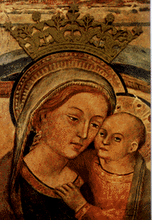
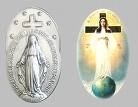




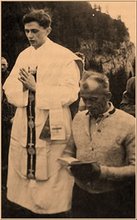
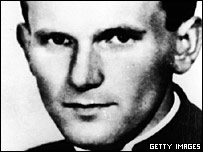
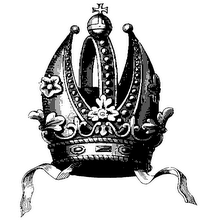

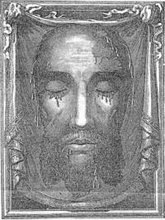


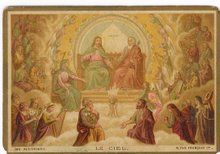




01.jpg)
























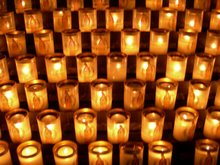
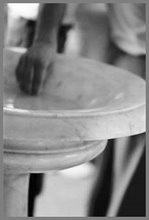
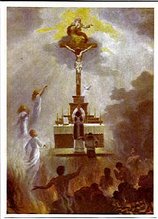


9 comments:
This is my first time visiting your site and have found it very edifying! I too find myself struggling with the same things in life. Each day I have to humbly ask the Lord to grant me the grace to die to self. In the eyes of many my "little steps" of self denial may seem insignificant. Yet, I believe in the eyes of our loving Creator they are honored and He sees the intention that each of us have in our hearts. May each of us who are on this journey to the Father follow the example of the Blessed Mother and say "YES" to Our Lord! A blessed evening to all who visit your wonderful site. John K.
Sanctus belle --
Enjoy your blog as usual today. You always give me food for thought.
Here are some of my thoughts today:
(1) comforts per se -- in and of themselves -- never are in and of themselves sins either sins or virtues. Like many other instrumental things (guns, penicillin) they are indifferent. It is always the persons who use them who may or may not be sinful or virtuous.
Consider that in your particular situation the comforts that concern you may in fact be your mortification or your penance. Is the issue in fact not that you reject them, but that you rise above them and become indifferent to them?
(2) Suffering sought out, suffering artificially arranged, never is a virtue. God will indeed send you your cross(es) of his choosing and at his time(s); hopefully you will bear them gracefully. To create artificial sufferings for yourself is to put yourself in the place of God; I'm sure you never would want to be guilty of that arrogance.
Mortification is a very dangerous concept. Better to accept whatever circumstances your find yourself in (St. Paul) and give them whatever response God wishes for those circumstances.
You can learn much more about Pauline Jaricot at: http://www.philomena.org
Sanctus Belle: Very timely post. I've been reflecting lately on how my desire for comfort may be hindering my complete devotion to Christ.
God allows us to enjoy the comforts of our labours. there is nothing inherently wrong with enjoying good food, your home and what is in it, or a car for that matter. we are not prohibted from ejoying what we have. its when we lust for material posessions, and are greedy for it and envious that it is a problem. but enjoying it we are allowed to do. there is nothing sinful or shameful about enjoying what we have. as a matter of fact, we should thank God for all that we have, and the fact that we can and should enjoy what we have.
Thanks for hosting such a grand blog site. Like Josef_63, I, too have just found this site; and I, too, have had to struggle with these things.
I appreciate also the comments of Irene who points out that the comforts of life are neither sins or virtues; in fact, they are given to us as good things to use on the spiritual journey. Also, mortification, in excess, can cause problems. I remember that St. Ignatius of Loyola regretted the extraordinary fasting that he undertook in the beginning stages of his conversion. He said that it damaged his health and left him less able to carry out his life of service.
My understanding, however, is that the Church teaches that we need to do penance and keep our passions and desires under control. If we are indifferent to them, then we have "died" to them, which is what mortification means. All the saints and masters of the spiritual life (that I have read) say that the more we love earthly things the harder it is to love and strive for the things of heaven. So, mortification in this sense is necessary for us. The main question for us as lay people is how to carry this out.
The quotation from St. Anthony Claret reminded me of something he said either in his autobiography or elsewhere. He was in the habit of practicing mortification of the eyes; i.e. he would never look at directly at a female lest her attractiveness become a source of temptation to him. As a result, he said that even though he confirmed hundreds or thousands of young Cubans (when he was bishop there), he could not say what the distinctive facial characteristics of Cubans were.
Lastly, a quote from Thomas a Kempis:
Do thou, then, O disciple of Jesus, drink deeply from this bitter cup as a cure for the indulgence of thy appetites; for if thou would sup with Christ in the Kingdom of His Father, thy heart must not be set upon dainty food, or draughts of costly wine; thou must not long for soft beds or fine clothes. Such things are out of keeping with the spotless life of Jesus, and with His most bitter Passion. Be on thy guard against yielding to the lusts of the flesh; keep thy sensual impulses in check by being moderate in thy food; and if thou shouldst have exceeded by taking too much or too dainty food, then by daily toil and nightly vigil chasten thyself for thy fault, keeping ever sorrowfully in mind the bitter cup of Christ.
I agree with Cathy of Alex with the sparkling eyes. A very timely post. But then for me, penance is always a timely subject. In the words of Pope Pius XII, given in a Homily on the canonization of St. Mariana de Jesus de Paredes on July 9, 1950, "Nothing is better able to restrain the movements of the soul, better able to subject to right reason the natural appetites, than penance."
Sanctus Belle, your Blog is always edifying. More importantly, your friendship edifies me. My own sister will have nothing to do with me since she left the Church. And so I have adopted you as my new sister.
:)
Paul, I am honored and indeed you are also my brother in Christ. I wish with all my heart that my real brother had faith such as yours, how proud I would be.
Sanctus Belle, is that your own holy card. It appears to have a relic of his on the bottom.
Post a Comment